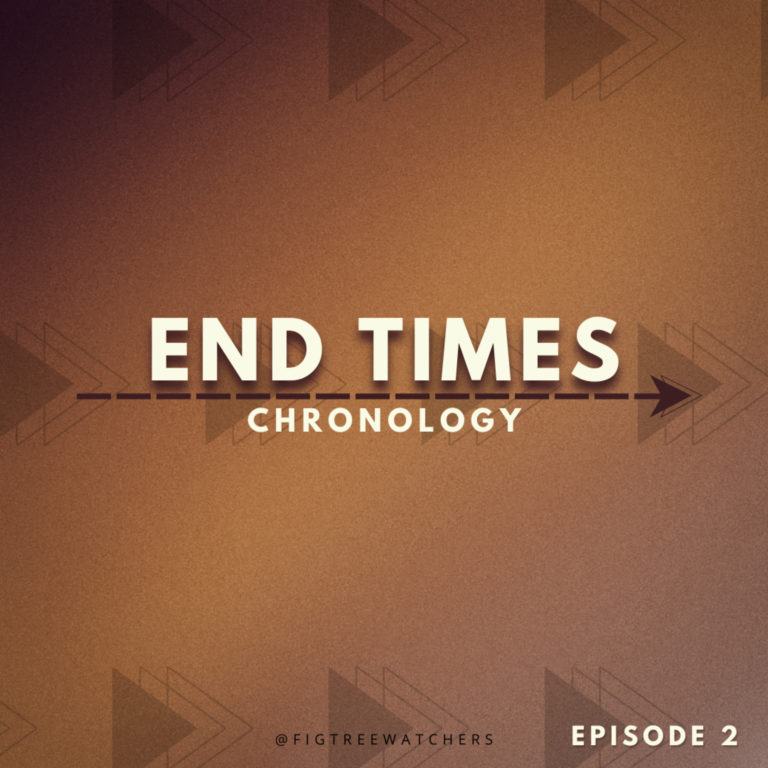
To share the Gospel, through the expository teaching of Scripture. Creating disciples-of Christ. Encouraging others to love God and others.
Website: www.figtreewatchers.com
Instagram: https://www.instagram.com/figtreewatchers/
Facebook: https://www.facebook.com/figtreewatchers/
Telegram: https://t.me/figtreewatchers
In this episode we continued our look into Preterism and gave a few more reasons why we don’t agree with the view; due to its embrace of replacement theology and the dating of the book of Revelation.
Co-Hosted by Ayomikun Shosanya & Stephan Caraway.
Navigate to the links below to access the show notes for this episode which contains links to the stories we went over as well as articles, social media accounts, and other resources. If you enjoyed this episode, and are blessed by the ministry, we’d greatly appreciate it if you left a rating and a review.
Episode 132
Episode notes: https://www.figtreewatchers.com/figtreewatchers-podcast-episode-132-end-times-chronology-preterism-part-2/
Website: www.figtreewatchers.com
Instagram: https://www.instagram.com/figtreewatchers/
Facebook: https://www.facebook.com/figtreewatchers/
Telegram: https://t.me/figtreewatchers
Email: [email protected]

In this episode we continued our look into Preterism and gave a few more reasons why we don’t agree with the view; due to its embrace of replacement theology and the dating of the book of Revelation. For a downloadable version of the show notes, click download below.
Problems with the View
Embraces Replacement Theology
- Definition: For those not familiar, replacement theology is the view that God is done with his covenant people and that all the promises attributed to them are now fulfilled in the church.
- Replacement theology teaches that the church is the replacement for Israel and that the many promises made to Israel in the Bible are fulfilled in the Christian church, not in Israel. (What is replacement theology/supersessionism?)
- The prophecies in Scripture concerning the blessing and restoration of Israel to the Promised Land are spiritualized or allegorized into promises of God’s blessing for the church. (What is replacement theology/supersessionism?)
- Preterists believe that God’s covenant with Israel has ended. As GotQuestions states in their article, What is the preterist view of the end times?, scripture makes it clear that “God’s covenant with Israel is everlasting (Jeremiah 31:33–36), and there will be a future restoration of Israel (Isaiah 11:12)”
Date of Revelation Disputes Preterism
The date Preterists use is controversial and is disputed. The universal argument made by Preterists is that the Roman – Jewish war of AD 66-70, that ended with the destruction of Jerusalem and the temple, fulfill the vast majority of the prophetic predictions of Revelation. In the book, The Days of Vengeance: A Review Article, Kenneth Gentry states,
“‘Things which must shortly take place’ emphatically proves that Revelation must be written before the date of 66 AD. In order for Preterism to be true Revelation must be written before 66 AD.” (Kenneth L. Gentry, “The Days of Vengeance: A Review Article,” The Counsel of Chalcedon, Vol. IX, No. 4., p. 11.)
Weirdly enough, he even admits that if the date is wrong, “Preterism would go up in smoke.” (Kenneth L. Gentry, “The Days of Vengeance: A Review Article,” The Counsel of Chalcedon, Vol. IX, No. 4., p. 11.) In his other work, The Beast of Revelation, he states,
“If the late-date of around A.D. 95-96 is accepted, a wholly different situation would prevail. The events in the mid to late 60s of the first century would be absolutely excluded as possible fulfillments. The prophecies within Revelation would be opened to an abundance of speculative scenarios, which could be extrapolated into the indefinite future. Revelation might… focus exclusively on the end of history, which would begin approaching thousands of years after John’s time, either before, after, or during the tribulation or the millennium. The purpose of Revelation would then be to show early Christians that things will get worse, that history will be a time of constant and increased suffering for the Church.” (Emphasis his. Kenneth L. Gentry, The Beast of Revelation (Tyler, TX: Dominion Press, 1994), 86.)
Internal Evidence for the 95 AD Date – The Church of Ephesus
So let us now examine the internal proof from scripture that provide us a 95 AD Date for the book of Revelation.
Jesus commends the church for their hatred of the wicked deeds of the Nicolaitans (Revelation 2:6). This was obviously an issue for this church, so why did Paul not even address this issue with Timothy in either of his letters to Timothy who was the pastor at Ephesus?
According to the ESV Study Bible, Paul wrote 2 Timothy between 64 AD and as late as 67AD. So if the book of Revelation was written in 65 AD as Preterist claim, then the Nicolaitan Heresy would have been addressed by Paul, but it was not, thus, proving the later date of 95 AD.
Another note demonstrating that Revelation is futuristic in claim is the warning from Jesus that if they, the church of Ephesus, did not repent and learn to love God and others, he would remove their lampstand. The “Lampstand” was removed around the year 800 AD when Muslim raiders wiped out the city and destroyed the church. To this day there is no permanent congregation or active Christian Church in Ephesus.
But perhaps the best argument against an early date is made by James M. Rochford.
“The late date explains why John, Paul, and Timothy never mention one another together in Ephesus. If the early date is true, then John would have been leading in Ephesus at the same time as Paul and Timothy. Why would Paul leave Timothy in charge of the Ephesian church if the apostle John was there? Moreover, at the end of 2 Timothy, Paul mentions 17 coworkers by name, but he never mentions John. We are not merely making an argument from silence. This is a conspicuous silence. Why wouldn’t Paul mention such a spiritual titan like John? Likewise, why wouldn’t Jesus mention Paul or Timothy when writing to the church of Ephesus? (Rev. 2:1-7)” (Date of Revelation)
Sources
- What is replacement theology / supersessionism? (Got Questions)
- Preterist (Marriam-Webster Dictionary)
- The Trouble with Preterism (Israel My Glory)
- What is partial preterism? Is it biblical? What do partial preterists believe? (Compelling Truth)
- Thomas Ice and Kenneth L. Gentry, Jr., The Great Tribulation: Past or Future? (Grand Rapids, MI: Kregel, 1999), 26–27.
- Kenneth L. Gentry, “The Days of Vengeance: A Review Article,” The Counsel of Chalcedon, Vol. IX, No. 4., p. 11.
- Date of Revelation (Evidence Unseen)
- Debunking Preterism by Brock David Hollett
- Preterism: Has All Prophecy Been Fulfilled? (The Gospel Coalition)
- What is the preterist view of the end times? (Got Questions)
Social Media & Sharing
If you were blessed by our content follow us on Instagram, Facebook, or Telegram. Subscribe to our podcast wherever you listen to podcasts and please give us a rating and a review. It would be very helpful and greatly appreciated.
Also, our passion is to answer any questions you may have regarding bible prophecy and current events. To that end, we encourage you to submit questions you have or send us a topic idea that you’d like to see get covered.
All requests and/or questions can be emailed to [email protected] or you can send us a DM on our social media pages. We look forward to hearing from you soon.
The Gospel Presentation
Revelation 19:10 tells us that the essence of bible prophecy is Jesus Christ. These things were revealed to us so that we ultimately believe in Christ (John 13:19). We’ve all sinned and fallen short of the glory of God (Psalm 51:5, Romans 3:23). Because God is Holy he must judge sin. The penalty of this sin is death and ultimately the Lake of fire (Romans 6:23, Revelation 20:11-15). There’s nothing we can do to save ourselves (Isaiah 64:6).
But God, in his love has provided a way to escape his wrath through Christ (John 3:16-18, John 14:6). Jesus paid for our sin penalty by taking God’s wrath in our stead on the cross (Romans 5:8). He died for our sins, was buried, and rose again 3 days later (1 Corinthians 15:1-5).
You can accept this free gift of salvation by believing in Christ (Acts 16:30-31, Romans 6:23, Ephesians 2:8-9). Make sure you’ve made the right decision about Jesus today (2 Corinthians 6:2)! It will be the most important decision of your life, for eternal life.

